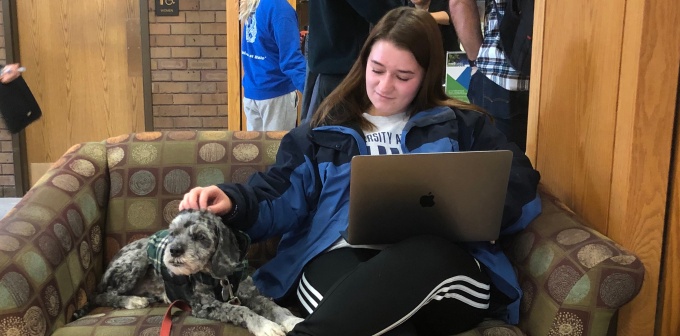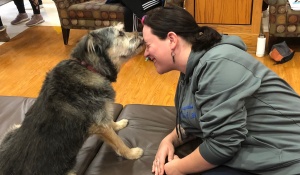
Professors Mark and Christine Bartholomew's dog, Norm, offers canine comfort to a law student.
New on-site counselor adds to wellness initiatives for law students
Depression. Anxiety. Family and relationship troubles. Academic stress. No time for self-care. Health emergencies. The intense experience of law school can sometimes surface physical or mental health challenges, and UB School of Law students aren’t immune. Now, in a time when society in general is more aware of these concerns, the school continues to expand its efforts to make help readily available to students who need it.

Thomas J. Neill
The newest addition is an in-house counselor – Thomas J. Neill, an experienced licensed clinical social worker – who’ll be in O’Brian Hall two days a week as a front-line resource for students seeking help.
“We’ve known for a long, long time that these issues are present in law school and the larger legal community,” says Bernadette Gargano, vice dean for student affairs and director of the Law, Legal Analysis, Writing and Research Program. “And a lot of people in practice are becoming more aware that by taking care of themselves, they can be more productive in life and at work. It’s about finding the correct type of balance.”
The law school has a Wellness & Equity Task Force that meets monthly, and the Student Bar Association has been active in advocating for wellness initiatives. As a result, a series of measures is in place to support students’ well-being. They include:
Professor James Milles' dog, Elke, provides her form of therapy to a willing law student.
- “Wellness Weeks” focused on stress relief, with healthy snacks and hugely popular visits by therapy dogs, as well as flu shots, blood pressure checks and wellness raffles.
- A wide range of University services, including counseling, small emergency loans, crisis management and a food pantry.
- Academic support from the first day of law school, including a Fall Study and Review Week, which is mandatory for students and offers targeted support.
- During exam weeks, bagels, coffee and juice are there for the taking.
- A new Peer-to-Peer Advocates program, a student-to-student outreach effort, as well as a support group for students with depression.
- Access to Law Lifeline, an extensive online resource for mental health in law school.
“It’s a big transition for students to come to law school,” Gargano notes, “and there are particular challenges and stressors that go along with law school, licensure, and practice that aren’t necessarily there in other programs.”
Abisha Vijayashanthar ’20, president of the Student Bar Association, knows those stresses all too well. As she completes her joint degree in law and public health, she remembers the steep learning curve of those first semesters.
“What worked in undergrad doesn’t necessarily work in law school,” Vijayashanthar says. “In undergrad, you’re typically focusing on just your studies, but in law school it’s not just about your academics. You have to be involved in extracurriculars, in clubs, in journals, in trial team or moot court. You need work experience as well, and sometimes that carries right through into the semester. The academics are incredibly rigorous, and you have to balance that with your extracurriculars, your work, and the responsibilities of being an adult, paying rent and car repairs, taking care of children or family members, and other financial stressors.”
She says these stresses manifest most often as depression, anxiety and burnout: “It’s always a fear that you’re not doing enough, and is this going to be good enough, even if you have a lot of support.”
That’s the culture in which Neill will immerse himself from his new office on the fifth floor of O’Brian Hall. A counselor with UB for more than 17 years, Neill will be in residence Mondays and Wednesdays.
“I’ve worked with law students throughout my career,” Neill says, “so I’m familiar with what law students experience. As part of the law school community, I look forward to understanding more of the nuances of that.”
The goal, he says, is to help students recognize mental health issues when they arise, decrease the stigma around seeking services, and simply make it easier for students to access counseling when they need it. Faculty and staff members may also reach out to him, he says, when they notice a student is having trouble.
“Really,” Neill says, “we want to raise awareness and communicate that the law school is being very thoughtful about mental health issues, and they care. I’ve been really impressed by the amount of compassion and concern that I’ve seen.”
